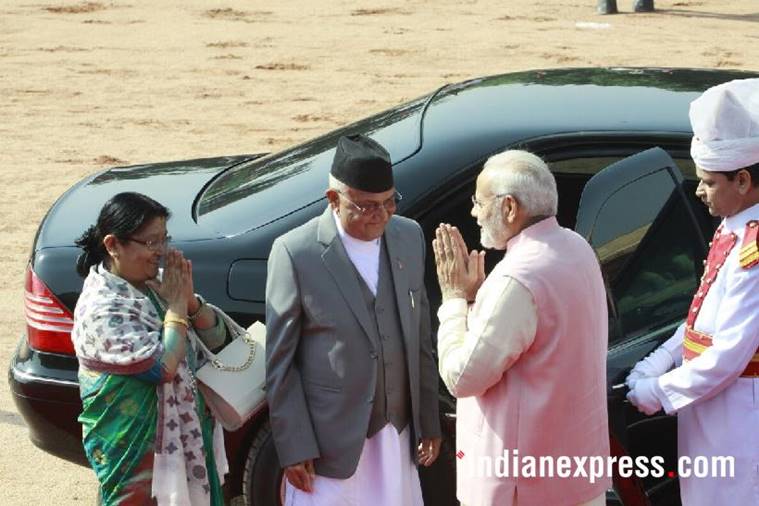 After a bilateral meeting the two leaders, Modi announced that the two countries had agreed on a railway link as well as inland water connectivity – Nepal will not only be “land-linked”, Modi said, but also “water-linked”. (Express Photo by Praveen Jain)
After a bilateral meeting the two leaders, Modi announced that the two countries had agreed on a railway link as well as inland water connectivity – Nepal will not only be “land-linked”, Modi said, but also “water-linked”. (Express Photo by Praveen Jain)
With Prime Minister Narendra Modi listening, Nepal Prime Minister K P Oli on Saturday said he wanted to build a strong edifice of “trust-based” relationship between the two countries. “I have come to India with an aim to enhance our relations to newer heights commensurate with the realities of the 21st century,” he said amidst concerns in India over China making inroads into the Himalayan republic.
After a bilateral meeting the two leaders, Modi announced that the two countries had agreed on a railway link as well as inland water connectivity – Nepal will not only be “land-linked”, Modi said, but also “water-linked”.
A joint statement on the rail link said, “With the objective of expanding connectivity to enhance people-to-people linkages and promote economic growth and development, the Prime Ministers of India and Nepal agreed to construct a new electrified rail line, with India’s financial support, connecting the border city of Raxaul in India to Kathmandu in Nepal”.
This is perceived to be in response to reports that China and Nepal had agreed to start technical works to build a cross-border railway link via Tibet to boost connectivity. This was decided in September last year during the visit of Nepalese Deputy Prime Minister and Foreign Minister Krishna Bahadur Mahara to Beijing.
Another joint statement on inland waterways said, “Taking cognizance of their geographies and noting the development of inland waterways in both countries, the two Prime Ministers took the landmark decision to develop the inland waterways for the movement of cargo, within the framework of trade and transit arrangements, providing additional access to sea for Nepal. This new initiative would enable cost effective and efficient movement of cargo. The Prime Minister of Nepal noted the enormous impact the additional connectivity would have on the growth of business and economy of Nepal.”
While connectivity was the focus of the outcomes between the two sides, agriculture was another new area of cooperation. Oli told Modi that he was keen to explore cooperation in the field of agriculture, especially in technology modernisation and organic farming. Foreign secretary Vijay Gokhale called these three new areas – railways, waterways and agriculture – as new “game changing” areas of cooperation.
Modi, however, also underlined the issue of inclusion while developing Nepal, keeping in mind the demands of the Madhesis. In his meeting, Gokhale said, “the Prime Minister expressed hope that the Nepalese PM would carry (along) all segments of society in the political and economic development of Nepal, that social stability will be maintained, that economic progress could be made.” Modi stressed on “social justice” and “social unity” in his conversation, Gokhale said, in an oblique reference to the issues and challenges faced by the Madhesis.
In a press statement issued by Modi along with Oli, the Indian PM said the Nepalese PM’s vision for a “prosperous Nepal and developed Nepal” was in sync with his vision of “sabka sath sabka vikas”.
Oli, however, emphasised on the “principles of equality, justice and mutual respect” — a reference to the blockade that disrupted Nepal’s economy in 2015 during the Madhesi agitation.
The differing choice of words displayed the sense of disquiet in the relationship between the two countries, which has been strained in the last couple of years. Gokhale, however, denied that China was discussed during the meeting between the two leaders, and maintained that bilateral relations was the focus of the conversation.
Indian ambassador to Nepal Manjeev Singh Puri called the visit – Oli’s first after taking charge in his second term – as “significant”, and pointed to India’s assistance to Nepal in the aftermath of the 2015 earthquake. Oli has met External Affairs minister Sushma Swaraj, Home minister Rajnath Singh and Congress vice president Rahul Gandhi since his arrival on Friday.